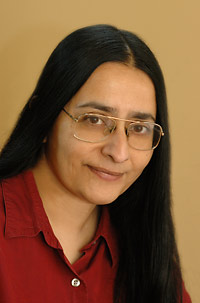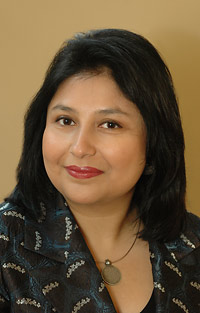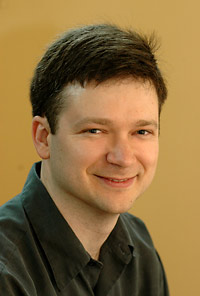UC Berkeley Press Release
Distinguished Teaching Awards announced
BERKELEY – Two assistant professors and a lecturer at the University of California, Berkeley, are recipients of the campus's prestigious 2006 Distinguished Teaching Award. The award, bestowed by the Berkeley Division of the Academic Senate's Committee on Teaching, is the highest honor for instruction given by UC Berkeley.
Only five percent of those who have taught on campus since 1959 - the year the awards began - have received this award. This year's recipients bring the total to 219.
A ceremony honoring Ani Adhikari, a statistics lecturer; Ananya Roy, an assistant professor of city and regional planning; and David Wagner, an assistant professor of computer science; will be held tomorrow (Wednesday, April 26) at 5 p.m. at the campus's Zellerbach Playhouse. This year, a student-produced video about each of the recipients will be shown during the event, which is open to the public.
All three of this year's awardees received their Ph.Ds from UC Berkeley.
Also at the ceremony, the Educational Initiatives Award will be presented to the Public Health Undergraduate Program at the campus's School of Public Health. The award is presented annually to a department or unit in recognition of distinctive contributions to undergraduate education.
 Ani Adhikari (Peg Skorpinski photos) |
Ani Adhikari
Department of Statistics
A bit of theatrics, a few jokes, perhaps some confrontation, and intimate engagement with students is Ani Adhikari's key to enlivening the dry subject of statistics.
"Students like a sharp-tongued professor, if the sharp tongue is not directed towards them," said Adhikari, a native of Calcutta, India, who received her Ph.D. from UC Berkeley and has lectured in the statistics department for nearly 10 years. "I really wish I could be Professor Snape from Harry Potter."
Eschewing electronic media like Powerpoint, she writes and sketches on the blackboard and draws students into statistical problems with drama and a bit of suspense, even in the 250-student "Introduction to Statistics," or "Stat 2," classes. But she is uncompromising about honesty. "Even at the highest levels, people tend to dazzle you with not very well-founded statistical arguments," she said. "I do not allow any student to hide behind jargon or calculations or formulas."
"Adhikari's teaching methods are a tradition that should be passed down," said her former student, Sadhana Nathan. "I decided to sit in on her 'Statistics 2' lectures last fall because I had learned so much in her class, and I wanted to pass on her teaching techniques to the high schoolers that I was working with in the statistics classes at Berkeley High. Her style ... still makes me nostalgic every time I think of her class."
Adhikari almost didn't make it to UC Berkeley. Turned down by the Graduate Division because she attended a three-year program at the Indian Statistical Institute, she was surprised to receive a cable from one of the legends of statistics, the late UC Berkeley professor Lucien Le Cam: "Please disregard Graduate Division letter. Department recommends highly."
"It was like receiving a cable from the Beatles," she said. After obtaining her Ph.D. in 1986 and teaching at Stanford University, she returned to teach at UC Berkeley in 1996. Since then, she has been instrumental in developing a pedagogy course for graduate student instructors who are teaching assistants in statistics courses.
"I did my degree at this university and I learned from this department," she said, "and I am having a ball returning what was given to me. It keeps me young."
 Ananya Roy |
Ananya Roy
Department of City and Regional Planning
A letter nominating Ananya Roy for a Distinguished Teaching Award lauded the assistant professor and chair of urban studies as "one of the most gifted teachers in the 57-year history of the Department of City and Regional Planning."
The sentiments of the authors, Robert Cervero and Martin Wachs, chair and professor emeritus, respectively, of that department, were echoed by a student who said in his evaluation of Roy that he had never had a professor "more well-informed, dynamic, knowledgeable, articulate and inspiring."
Roy whose current research examines the policies governing public health and poverty on a global level, said her teaching is guided by three principles.
"First," Roy said, "I seek to globalize the curriculum of urban studies and planning, educating students about the great cities that lie outside the domain of their Euro-American experiences: Calcutta, Cairo, Rio de Janeiro, Manila, Nairobi.
"I want my students to rethink their pre-conceived atlases: to not just fit these urbanisms into what they already know but rather to craft entirely new paradigms of urban order and function. And more boldly, I want them to call into question the geopolitical hierarchies, such as First World and Third World, through which we have ordered the world."
A native of Calcutta, Roy earned her B.A. in comparative urban studies from Mills College in Oakland and received a M.C.P. and Ph.D. in city and regional planning from UC Berkeley. She taught in the sociology department at Mills College in 1996 and joined the UC Berkeley faculty in 1999.
Roy also is chair of her department's undergraduate urban studies major, associate dean of academic affairs for International & Area Studies, and faculty director of the Berkeley Programs for Study Abroad.
She said teaching requires more than being in the classroom and serving as an advisor and mentor - it also includes taking on institutional roles and administrative duties.
"There is a lot of work to be done to preserve this beautiful but fragile ideal called a public university, to ensure excellence and inclusion in public education," Roy said.
 David Wagner |
David Wagner
Department of Electrical Engineering and Computer Sciences
When students in David Wagner's class raise their hands to give him a hard time about something he just said, or leave class debating a point in his lecture, he knows he's succeeded as a teacher.
"My ideal classroom scenario is one where students are active learners forming their own conclusions," said Wagner. "I try to get students engaged in debating the material or puzzling through it themselves."
The decision to go into a field of work that required teaching was not an easy one for the assistant professor of computer science. During the years he spent working toward an A.B. in mathematics from Princeton University and a Ph.D. in computer science at UC Berkeley, he had very little experience as a teacher and a lot of trepidation about being one. But after starting at UC Berkeley in 2000, he knew he'd made the right choice. "Not only did I like the teaching, I loved it," he said.
Wagner draws on his own experiences to get his points across to students, said Karl Chen, a Ph.D. student in computer science at UC Berkeley who took two classes from Wagner as an undergraduate. "He has a unique teaching style," Chen said. "His lectures are very interactive, and he relates to students by talking about his past experiences, so his lectures feel like a story that's unfolding."
The first time Wagner taught CS 70, "Discrete Mathematics for Computer Science," Chen was in the classroom. "It was the single best undergraduate course I took," he said. "This course fueled my love for computer science."
Wagner is recognized as one of the world's leading cryptographers and experts in computer security. In 2002, the magazine "Popular Science" named him one of their "Brilliant 10." In a letter recommending Wagner for the teaching award, Richard M. Karp, University Professor in the Department of Electrical Engineering and Computer Sciences, said that Wagner's stature as a researcher informs his teaching.
"He has invented most of the main techniques for the analysis of cryptographic protocols, won early fame for his exploits in breaking cryptographic systems, and has contributed greatly to providing a rigorous foundation for the field of software security," Karp wrote.
Educational Initiatives Award
The 2006 winner, the Public Health Undergraduate Program in the School of Public Health, represents a major national innovation in the field: It is one of only two fully developed undergraduate public health majors in the country and the only one that is part of a professional school of public health.
The major, with over 220 students, has six rigorous core courses - biostatistics, epidemiology, environmental health, health policy and management, community health and human behavior, and public health microbiology. It also includes an honors program, two student groups, a peer mentor program, an internship program, and a summer training program. Student response to the major has been overwhelming; there are 300 students on the waiting list.

